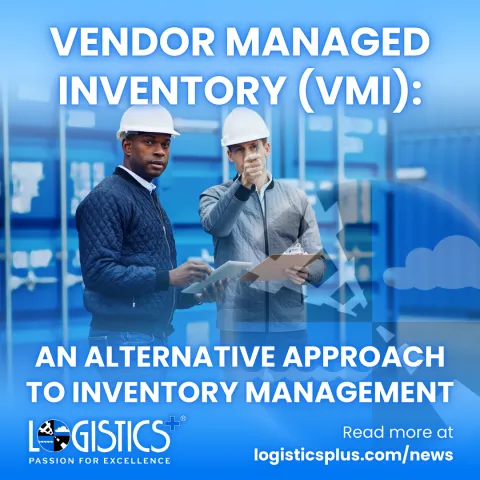
by susheel | Feb 17, 2025 | News, Uncategorized
Businesses are always looking for ways to optimize inventory, reduce costs, and enhance efficiency. One powerful strategy that has gained momentum is Vendor Managed Inventory (VMI). This solution shifts inventory management responsibility from the buyer to the supplier or a third-party inventory manager like Logistics Plus.
But what exactly is VMI, and how can it benefit your business? Let’s explore how Logistics Plus can help streamline vendor inventory management with its innovative supply chain solutions.
What is Vendor Managed Inventory (VMI)?
VMI is a supply chain strategy where suppliers or 3PLs take charge of managing and replenishing inventory based on real-time demand and usage data. This proactive approach reduces stockouts, minimizes excess inventory, and improves overall supply chain efficiency. With VMI, suppliers access a buyer’s inventory levels and sales data, allowing them to make informed replenishment decisions. This removes the guesswork from inventory management and fosters stronger collaboration between suppliers and buyers.
The Benefits of VMI
• Optimized Stock Levels – Real-time data analysis ensures optimal inventory levels, reducing overstocking and stockouts.
• Potential Cost Savings – Lower holding costs, reduced administrative burdens, and minimized stockouts lead to cost reductions.
• Strengthened Supplier-Buyer Relationships – Improved communication and collaboration foster long-term business partnerships.
• Better Visibility – Access to real-time demand data enhances forecasting accuracy and reduces disruptions.
• Enhanced Customer Satisfaction – Reliable stock availability ensures a seamless experience for end customers.
Industries That Benefit from VMI
Various industries can leverage VMI for streamlined operations, including:
• Retail: Keeping shelves stocked with fast-moving consumer goods.
• Manufacturing: Preventing parts shortages to maintain smooth production lines.
• Pharma & Healthcare: Ensuring the efficient management of critical medical supplies.
• Automotive: Supporting just-in-time inventory for essential components.
Challenges of VMI Implementation
Despite its advantages, VMI does have challenges, such as:
• Seamless Technology Integration: Effective VMI requires smooth data sharing, often needing ERP system investments.
• Trust and Transparency: Businesses must share sales data and rely on suppliers for inventory decisions.
• Vendor Reliability: Supplier performance is critical to the success of a VMI program.
Is VMI the Right Fit for Your Business?
If inventory inefficiencies, frequent stockouts, or high carrying costs are issues for your business, VMI could be the ideal solution. However, success depends on strong supplier partnerships and a commitment to data transparency.
How Logistics Plus Enhances VMI Implementation
Logistics Plus (LP) offers a suite of supply chain solutions designed to support VMI strategies:
• Advanced Inventory Management: LP’s sophisticated system leverages data analysis and technology to optimize inventory levels, track stock movements in real-time, and make informed storage and fulfillment decisions, ensuring efficient stock handling and distribution through our warehousing solutions.
• Technology-Driven Visibility: With MyLogisticsPlus™ and eWorldPlus™, businesses can access real-time inventory tracking, enabling seamless supplier-buyer communication.
• Efficient Fulfillment Services: LP’s tailored pick, pack, and ship solutions ensure vendor-managed inventory is handled quickly and accurately.
• Strategic Warehousing Locations: With nearly 10 million square feet of warehouse space across North America, LP optimizes inventory placement for faster transit times and improved efficiency.
Get Started with Logistics Plus
Vendor managed inventory isn’t just a strategy—it’s a transformative approach to supply chain management. By leveraging the right technology and partners, businesses can enhance efficiency, reduce costs, and strengthen supply chain relationships.
Ready to implement a VMI program? Start by assessing your inventory challenges and partnering with an experienced and capable 3PL like Logistics Plus to ensure a smooth transition. Contact us today to learn how we can help drive your VMI success.


by susheel | Jan 27, 2025 | News
In the vast and dynamic world of logistics, selecting the right trucking service provider can feel overwhelming, especially for someone new to the process. Understanding what works best for your shipping needs is crucial with countless options available. Whether you are a small business owner or an individual shipper, this guide will help you navigate the road ahead by outlining essential factors to consider when choosing a trucking service in the US.
Understand Your Shipping Needs
The first step in choosing a trucking service provider is assessing your shipping requirements. Consider the following:
- Type of Freight: Are you shipping perishable goods, hazardous materials, oversized items, or general merchandise? The nature of your cargo will dictate the type of service you need
- Shipment Size: Determine whether you require full truckload (FTL), less-than-truckload (LTL), or parcel services. FTL is ideal for large shipments that fill an entire truck, while LTL is more cost-effective for smaller loads.
- Destination: Consider whether you need regional, national, or international delivery. Long-haul trucking may differ significantly from local or regional services in terms of cost and transit time.
 Evaluate Equipment Types
Evaluate Equipment Types
Trucking equipment come in various forms, each tailored to different needs. Familiarize yourself with the options:
- Dry Van: The most common service, ideal for general goods that don’t require special conditions.
- Refrigerated (Reefer): For temperature-sensitive goods like food and pharmaceuticals.
- Flatbed: Perfect for oversized or oddly shaped items that can’t fit inside an enclosed trailer.
- Specialized Services: Includes tankers for liquids, lowboys for heavy machinery, and more.
Consider Cost Factors
Shipping costs can vary widely depending on multiple variables:
- Distance: Longer hauls naturally cost more, but efficient routing can save money.
- Weight and Volume: Heavier and bulkier shipments increase transportation costs.
- Seasonality: Demand for trucking services often spikes during peak seasons, such as holidays, which can increase prices.
- Additional Fees: Fuel surcharges, tolls, and accessorial charges (e.g., liftgate fees) can add to your costs.
Assess Reliability and Reputation
A trucking service provider’s reliability can make or break your shipping experience. Research potential carriers by:
- Checking Reviews: Look at online reviews and testimonials to gauge customer satisfaction.
- Assessing Track Records: Investigate the company’s history of on-time deliveries and cargo safety.
- Verifying Credentials: Ensure the carrier has the necessary licenses, insurance, and compliance with federal regulations.
 Prioritize Safety and Security
Prioritize Safety and Security
Your freight’s safety is paramount. Evaluate carriers based on the following:
- Insurance Coverage: Confirm the carrier’s insurance policy covers your shipment in case of loss or damage.
- Tracking Capabilities: Real-time tracking allows you to monitor your shipment’s progress.
- Driver Qualifications: Experienced and well-trained drivers are less likely to encounter issues on the road.
Account for Environmental Factors
Sustainability is increasingly important in logistics. If this aligns with your values, consider:
- Green Initiatives: Look for carriers that use fuel-efficient trucks or participate in sustainability programs.
- Carbon Offsets: Some companies offer options to offset your shipment’s carbon footprint.
- SmartWay Transport Partners: Carriers and logistics companies in this program partner with EPA to measure, benchmark, and improve logistics operations so they can reduce their environmental footprint.
Small but Significant Details
Don’t overlook these minute factors that can greatly influence your decision:
- Transit Times: Ensure the service can meet your deadlines.
- Communication: Reliable customer support is invaluable for addressing concerns promptly.
- Freight Handling: Check how the carrier manages loading and unloading to prevent loss and damage freight claims.
- Contract Terms: Read the fine print to avoid surprises, such as hidden fees or restrictive policies.
Why Logistics Plus?
If navigating these considerations feels daunting, don’t worry—Logistics Plus is here to help. With years of experience in freight management, we have earned a reputation for providing top-tier service and tailored solutions. Here’s why shippers choose us:
- Comprehensive Services: From LTL and FTL to specialized freight, we manage it all.
- Top Carriers: As a freight management partner, we work with almost all of the top 40 LTL carriers and thousands of specialized carriers. We do the vetting and negotiation so you can focus on managing your business.
- Advanced Technology: Our cutting-edge tracking tools keep you informed every step of the way.
- Expert Team: Our knowledgeable staff works closely with you to understand your needs and find the best solutions.
- Global Network: Whether domestic or international, we have the reach and resources to deliver.
Final Thoughts
Choosing the right trucking service provider doesn’t have to be overwhelming. You can make an informed decision by understanding your needs, evaluating your options, and considering all the critical factors. And when in doubt, Logistics Plus is here to guide you every mile of the way. Let us help you simplify your logistics so you can focus on what matters most—growing your business or ensuring your shipment reaches its destination safely and on time.
Ready to hit the road with confidence? Contact Logistics Plus today!






 Evaluate Equipment Types
Evaluate Equipment Types Prioritize Safety and Security
Prioritize Safety and Security